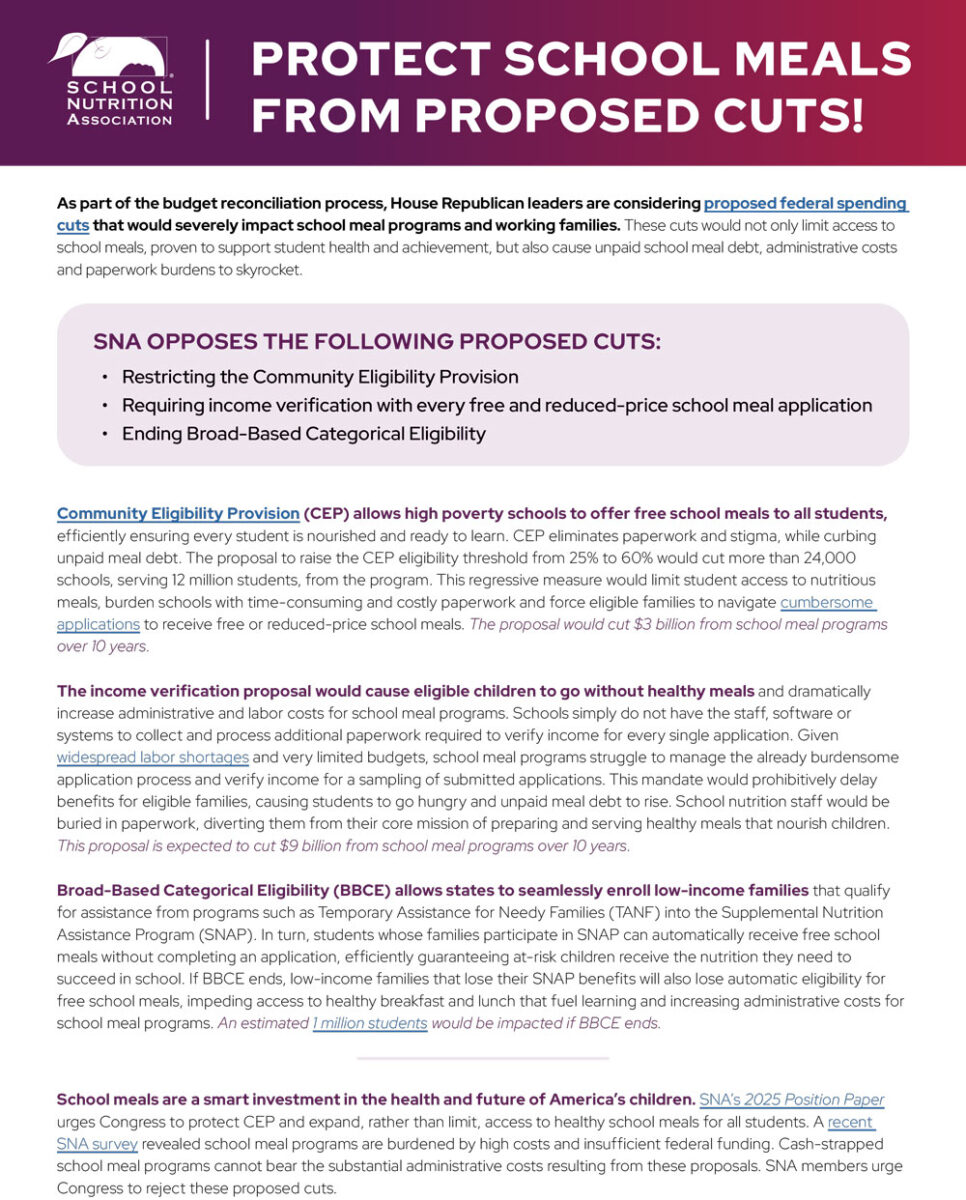Protect School Meals from Proposed Cuts!
As part of the budget reconciliation process, House Republican leaders are considering proposed federal spending cuts that would severely impact school meal programs and working families. These cuts would not only limit access to school meals, proven to support student health and achievement, but also cause unpaid school meal debt, administrative costs and paperwork burdens to skyrocket.
SNA OPPOSES THE FOLLOWING PROPOSED CUTS:
- Restricting the Community Eligibility Provision
- Requiring income verification with every free and reduced-price school meal application
- Ending Broad-Based Categorical Eligibility
Community Eligibility Provision (CEP) allows high poverty schools to offer free school meals to all students, efficiently ensuring every student is nourished and ready to learn. CEP eliminates paperwork and stigma, while curbing unpaid meal debt. The proposal to raise the CEP eligibility threshold from 25% to 60% would cut more than 24,000 schools, serving 12 million students, from the program. This regressive measure would limit student access to nutritious meals, burden schools with time-consuming and costly paperwork and force eligible families to navigate cumbersome applications to receive free or reduced-price school meals. The proposal would cut $3 billion from school meal programs over 10 years.
The income verification proposal would cause eligible children to go without healthy meals and dramatically increase administrative and labor costs for school meal programs. Schools simply do not have the staff, software or systems to collect and process additional paperwork required to verify income for every single application. Given widespread labor shortages and very limited budgets, school meal programs struggle to manage the already burdensome application process and verify income for a sampling of submitted applications. This mandate would prohibitively delay benefits for eligible families, causing students to go hungry and unpaid meal debt to rise. School nutrition staff would be buried in paperwork, diverting them from their core mission of preparing and serving healthy meals that nourish children. This proposal is expected to cut $9 billion from school meal programs over 10 years.
Broad-Based Categorical Eligibility (BBCE) allows states to seamlessly enroll low-income families that qualify for assistance from programs such as Temporary Assistance for Needy Families (TANF) into the Supplemental Nutrition Assistance Program (SNAP). In turn, students whose families participate in SNAP can automatically receive free school meals without completing an application, efficiently guaranteeing at-risk children receive the nutrition they need to succeed in school. If BBCE ends, low-income families that lose their SNAP benefits will also lose automatic eligibility for free school meals, impeding access to healthy breakfast and lunch that fuel learning and increasing administrative costs for school meal programs. An estimated 1 million students would be impacted if BBCE ends.
School meals are a smart investment in the health and future of America’s children. SNA’s 2025 Position Paper urges Congress to protect CEP and expand, rather than limit, access to healthy school meals for all students. A recent SNA survey revealed school meal programs are burdened by high costs and insufficient federal funding. Cash-strapped school meal programs cannot bear the substantial administrative costs resulting from these proposals. SNA members urge Congress to reject these proposed cuts.

Resource Type
Resource Meeting
Year Added
2025

